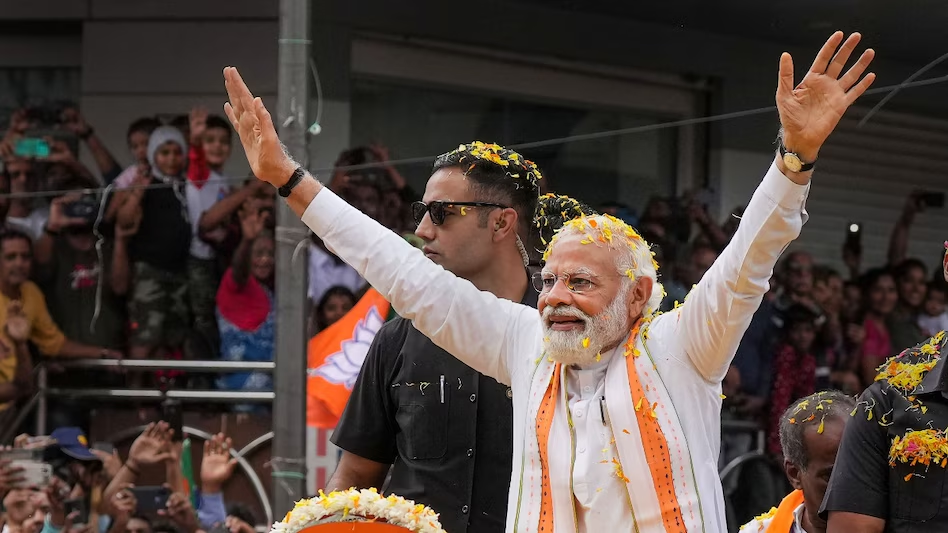As the results of the highly anticipated Lok Sabha elections trickle in, the nation awaits the final verdict on the political fate of India. The exit poll data released post the conclusion of the seven-phase elections hints at a resounding victory for Prime Minister Narendra Modi and his Bharatiya Janata Party (BJP). Despite being a decade into his tenure as the Prime Minister of India and having led the BJP to consecutive victories in the Lok Sabha elections, Modi’s popularity appears as unflinching as ever, with the BJP seemingly set for an unprecedented third consecutive term in power. However, amidst the widespread anticipation of the BJP’s return to power, variations in the predicted number of seats underscore the dynamic nature of Indian politics and the complexities involved in forecasting electoral outcomes.
Analysis:
- Modi’s Enduring Appeal: Narendra Modi’s leadership tenure has been defined by his charismatic appeal and a robust governance agenda. Over the past decade, he has managed to sustain a formidable presence in Indian politics, consolidating support across diverse demographics and regions. Modi’s proactive approach towards governance, coupled with his emphasis on development initiatives and nationalist rhetoric, has resonated strongly with voters, contributing to his enduring popularity and the BJP’s electoral successes.
- BJP’s Dominance: The exit poll results reaffirm the BJP’s dominance in the Indian political landscape. Despite facing criticism on various fronts, including economic challenges, social tensions, and regional disparities, the BJP appears poised for another electoral triumph. This underscores the party’s organizational prowess, effective campaigning strategies, and the enduring appeal of its leadership, particularly Narendra Modi, who has emerged as a towering figure in Indian politics.
- Predicted Seat Variations: While most exit polls predict a significant victory for the BJP and its allies, there are notable variations in the projected number of seats. While some polls forecast a conservative range of 350-365 seats for the BJP-led National Democratic Alliance (NDA), others are more bullish, predicting a landslide victory with over 400 seats. These variations highlight the inherent uncertainty in predicting electoral outcomes and the diverse methodologies employed by different polling agencies, further complicating the anticipation of the final election results.
- Implications of a Third Term: A potential third consecutive term for the BJP-led NDA government would have profound implications for India’s political landscape. It would cement the BJP’s position as the preeminent political force in India, providing continuity to Modi’s policy agenda and signaling a continuation of the party’s governance priorities. However, it would also raise pertinent questions about the state of India’s opposition parties, the health of democratic competition, and the balance of power within the Indian polity.
- Challenges Ahead: Despite the apparent electoral triumph anticipated by the exit polls, the BJP will encounter a multitude of challenges in its third term. Economic revival, social cohesion, agrarian distress, job creation, and healthcare reforms are just some of the pressing issues that demand urgent attention. Moreover, the BJP’s electoral success may also intensify concerns about democratic pluralism, minority rights, and the protection of fundamental freedoms in India, necessitating a balanced and inclusive approach to governance.
- International Ramifications: Narendra Modi’s victory in the Lok Sabha elections is likely to reverberate on the international stage, shaping India’s relations with neighboring countries and global powers. Modi’s assertive foreign policy stance, emphasis on national security, and pursuit of economic diplomacy are expected to persist, influencing India’s geopolitical positioning and strategic engagements in the South Asian region and beyond.
Conclusion: As the nation awaits the official declaration of election results, the exit poll data points towards Narendra Modi’s enduring popularity and the BJP’s formidable electoral prospects. However, amidst the optimism surrounding the BJP’s potential third term victory, it is imperative to acknowledge the complexities and challenges that lie ahead. The variations in predicted seat numbers underscore the volatility of Indian politics, while the implications of a BJP-led NDA government returning to power for a third term are significant, both domestically and internationally. As India navigates the path forward, the resilience of its democratic institutions, the inclusivity of its governance framework, and the leadership of Prime Minister Narendra Modi will be crucial determinants in shaping the country’s trajectory in the years to come.





